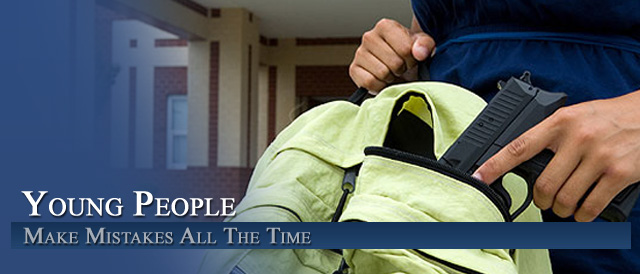
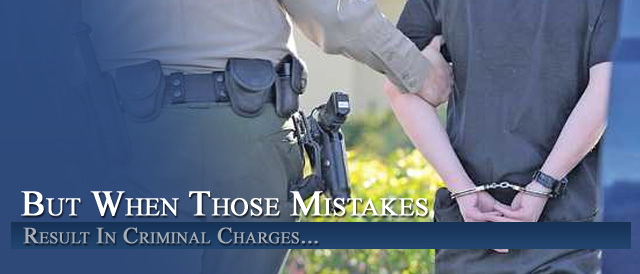
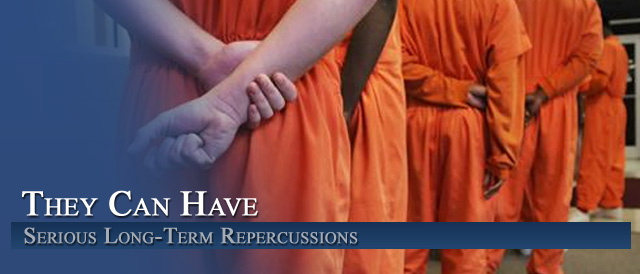
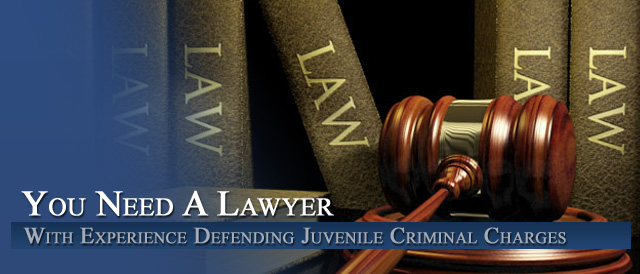
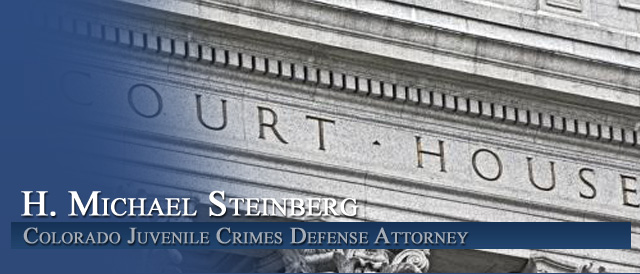
The Colorado Juvenile Criminal Sentencing Hearing – Part I of III
By H. Michael Steinberg Colorado Juvenile Criminal Defense Lawyer – Attorney
The Colorado Juvenile Criminal Sentencing Hearing Part I – this article addresses the options available to Magistrates and Judges in the Colorado Juvenile Justice Courts as well as the mandatory sentencing categories in cases of special juvenile classifications such as the aggravated juvenile offender, the mandatory juvenile offender and the repeat juvenile offender.
Historically, the focus of the Colorado juvenile justice system was one of the rehabilitation of the child. Colorado juvenile courts were seen as the “common guardian of the youth” who were introduced to the court system – mainly through an arrest. In those early days – the child’s “best interests” were paramount when reaching the best possible sentence for the criminally charged juvenile. Today – things have changed. Today the courts present as more of a “hybrid” of the juvenile and adult systems…some rehabilitation – some punishment.
Where at one time juveniles adjudicated in the juvenile justice system were not subject to the same punitive laws and tough sentences found in adult criminal court, the impact of several decades of more violent kinds of juvenile crime and the repeat nature (recidivism) of those crimes at times – has led to a sea change in the approach of the courts. Today, incapacitation in the form of detention – and other similar “adult type” sentencing approaches are done in the name of public safety and “deterrence.” The best interests of the child seems to have been pushed to the back burner.
The trends today – with few exceptions – point to increased and more severe punishment and “accountability.” Having an experienced and competent Colorado juvenile crimes defense lawyer is now more important as you wind your way through minefields of “well intentioned” adults.
The Colorado Juvenile Criminal Sentencing Hearing
After a juvenile has been “adjudicated” (convicted) of the crime or crimes with which he or she has been charged and following the pre-sentence investigation that usually follows, a sentencing hearing is what occurs next.
A judge has numerous options available to the court under several lengthy and complex sentencing statutes.
The court may enter a sentencing order or ” decree” sentencing a juvenile to any one or a combination of the following sentencing laws – as they may apply:
(a) Commitment to the Department of Human Services (19-2-909)
(d) Placement of custody with a relative or suitable person (19-2-912)
(e) Probation (19-2-913) (19-2-925 through 19-2-926)
(f) Commitment to the community accountability program (19-2-914)
(g) Placement with social services (19-2-915)
(h) Placement in hospital (19-2-916)
(k) Anger management treatment or any other appropriate treatment program (19-2-918.5)
(2) The judge may sentence the juvenile as a special offender (19-2-908)
(a) Mandatory offender sentencing
(b) Repeat juvenile offender sentencing
(c) Violent offender sentencing
(d) Aggravated juvenile offender sentencing
(3) A sentence may include parental conditions (19-2-919)
(4) If the sentence includes school attendance, notice to school is required
(5) If out-of-home placement is ordered the court shall consider criteria of 19-2-212, evaluation of 19-1-107 and 19-1-115(8)(e)
General Sentencing Schedule List 19-2-907 C.R.S.
Commitment 19-2-909 C.R.S.
A judge may “commit” a juvenile to the department of human services for a specific (determinate) period of up to two years if the juvenile is adjudicated for an offense that would constitute a felony or a misdemeanor if committed by an adult. This law does NOT apply if the child is younger than twelve years of age and is not adjudicated an aggravated juvenile offender. BUT a judge may not commit a juvenile to the department of human services UNLESS the juvenile is adjudicated for a criminal act that is a class 1, class 2, or class 3 felony if it was committed by an adult.
County Jail 19-2-910 (2) C.R.S.
If, on the date of the sentencing hearing, the defendant is eighteen years of age or older, he or she can be sentenced to county jail for a period not to exceed six months. OR that same juvenile can be sentenced to a community correctional facility (halfway house) for a period not to exceed one year. This sentence can be served “consecutively” (stacked one sentence on top of another) or “in intervals”, EVEN if the juvenile was ” adjudicated” for a juvenile delinquent that actually was committed PRIOR their eighteenth birthday.
Detention 19-2-911 C.R.S
For adjudications arising out of class 3, class 4, class 5, or class 6 felonies or for misdemeanors – a juvenile judge can sentence the juvenile to a period of detention not longer than forty-five days.
Custody with a Relative or Suitable Person 19-2-912 C.R.S.
Under this section of the law – a judge may place a juvenile in the legal custody of a relative or other suitable person under any reasonable conditions. Such conditions include placing the juvenile on probation or any other form of protective supervision.
Probation 19-2-913 C.R.S., 19-2-925 C.R.S., 19-2-926 C.R.S.
Probationary sentences are very similar to those placed on adults in similar situations. Certain standard conditions of probation almost always apply. In addition to the standard conditions such as commit no new crimes, a judge may impose additional conditions like:
(1) placing the juvenile in the intensive supervision program (JISP);
(2) participate in a supervised work program;
(3) county jail for those juveniles eighteen years of age or older at the time of sentencing. (If the jail is as a condition of probation – it cannot exceed ninety days – except when a sentence may be up to one hundred eighty days if the court orders the juvenile released for school attendance, job training, or employment.)
Community Accountability Program 19-2-914 C.R.S
A relatively new program called the community accountability program, can also be ordered as a condition of probation. These programs are intended for higher risk juveniles who might otherwise have been sentenced to a detention or out-of-home placement sentence or even have received a sentence to the department of human services.
These programs, however, have limited space and often function at maximum capacity. Their tolerance of “unacceptable behavior” is limited. If the juvenile fails at the program and is rejected from it – he or she is returned to the sentencing court for another sentencing hearing.
Social Services 19-2-915 C.R.S.
A judge may place “legal custody” of the juvenile in the county department of social services.
Hospital 19-2-916 C.R.S.
Under this section – a juvenile court judge, may enter an order that a juvenile be examined or treated by a physician, surgeon, psychiatrist, or psychologist or other special care by placing the juvenile in a hospital or other.
This does NOT apply to mental health facilities. Before placement is made in such facilities – the juvenile must undergo “a mental health hospital placement pre-screening .” The result of the pre-screening must terminate in a strong recommendation that the juvenile be placed in a facility for further evaluation.
For a standard “seventy-two-hour treatment and evaluation” to occur – there must first be a court hearing where competent professional evidence is presented by a mental health professional. That evidence must support a finding that mental illness is present in the juvenile. Only at that point can the juvenile be placed in a mental health facility. Furthermore – placement in the facility can only continue for such time as ordered by the court OR until a professional person in charge of the juvenile’s treatment reaches the conclusion that treatment is no longer necessary.
Fines/Restitution 19-2-917 C.R.S.
A juvenile court judge’s authority to enter a fine is set at no more than three hundred dollars.
Restitution: 19-2-918 C.R.S.
As a condition of almost every plea bargain, which includes such plea bargains as deferred adjudications, or adjudications following a trial, if the juvenile has damaged or lost the personal property of a victim, or has caused personal injury to the victim as a result of the delinquent act, restitution is ordered just as it is in adult criminal court.
Treatment Programs 19-2-918.5 C.R.S.
Some cases are very concerning. A relatively new law addresses juveniles who have been adjudicated for the commission of cruelty to animals where the evidence demonstrated the knowing or intentional torture or torment of an animal. These troubled young people may be ordered to complete an anger management treatment program or any other treatment program deemed appropriate by the court.
Community Referral and Review 19-2-210 C.R.S.
This law requires – prior to placement of a juvenile in a residential community placement – that the targeted juvenile’s case undergo a community review board whose purpose is to review the case file of the juvenile. The goal here is to objectively determine by utilizing certain risk assessment tools – the needs of the juvenile as weighed against the interests of the community.
Community Placement Parole and Transitional Services 19-2-909 (1)(b) C.R.S., 19-2-1002 C.R.S, et seq.
These three laws address the complex subject of juvenile parole. The Juvenile Parole Board, as does the adult parole board, may grant, deny, defer, suspend, or revoke the parole of a juvenile.
When juveniles committed to the department of human services there is a mandatory parole period of six months, but that parole can be extended if a juvenile has committed one or more offenses that would constitute a felony if committed by an adult ( examples include incest, aggravated incest, child abuse, etc.). In so called “special circumstance” – parole can be extended up to 15 months. See the statute at 19-2-909.
The Colorado Juvenile Criminal Sentencing Hearing – I
ABOUT THE AUTHOR: H. Michael Steinberg – Email The Author at: hmichaelsteinberg@colorado-juvenile-crimes-lawyeror call his office at 303-627-7777 during business hours – or call his cell if you cannot wait and need his immediate assistance – 720-227-7777.
If you are charged with A Colorado crime or you have questions about the Colorado Juvenile Criminal Sentencing Hearing, please call our office. The Law Offices of H. Michael Steinberg, in Denver, Colorado, provide criminal defense clients with effective, efficient, intelligent and strong legal advocacy. We can educate you and help you navigate the stressful and complex legal process related to your criminal defense issue.
H. Michael Steinberg, is a Denver, Colorado criminal defense lawyer with over 40 years of day to day courtroom experience – specializing in Colorado Criminal Law along the Front Range. He will provide you with a free initial case consultation to evaluate your legal issues and to answer your questions with an honest assessment of your options. Remember, it costs NOTHING to discuss your case. Call now for an immediate free phone consultation.
Helping Clients To Make Informed Decisions In the Defense of Colorado Criminal Cases.
Contact A Lawyer with Three Decades of Experience as a Denver Criminal Attorney at The Steinberg Colorado Criminal Defense Law Firm Today.
Colorado Defense Lawyer H. Michael Steinberg provides solid criminal defense for clients throughout the Front Range of Colorado – including the City and County courts of Adams County, Arapahoe County, City and County of Boulder, City and County of Broomfield, City and County of Denver, Douglas County, El Paso County – Colorado Springs, Gilpin County, Jefferson County, Larimer County, and Weld County,…. and all the other cities and counties of Colorado along the I-25 Corridor… on cases involving …The Colorado Juvenile Criminal Sentencing Hearing.
Other Articles of Interest:
- Sentencing – Restitution by Juvenile 19-2-918
- Colorado Juvenile Criminal Process – The Sentencing Decision
- The Colorado Juvenile Criminal Sentencing Hearing – Part III of III
- Sentencing – Community Accountability Program 19-2-914
- The Colorado Juvenile Criminal Sentencing Hearing – Part II of III













